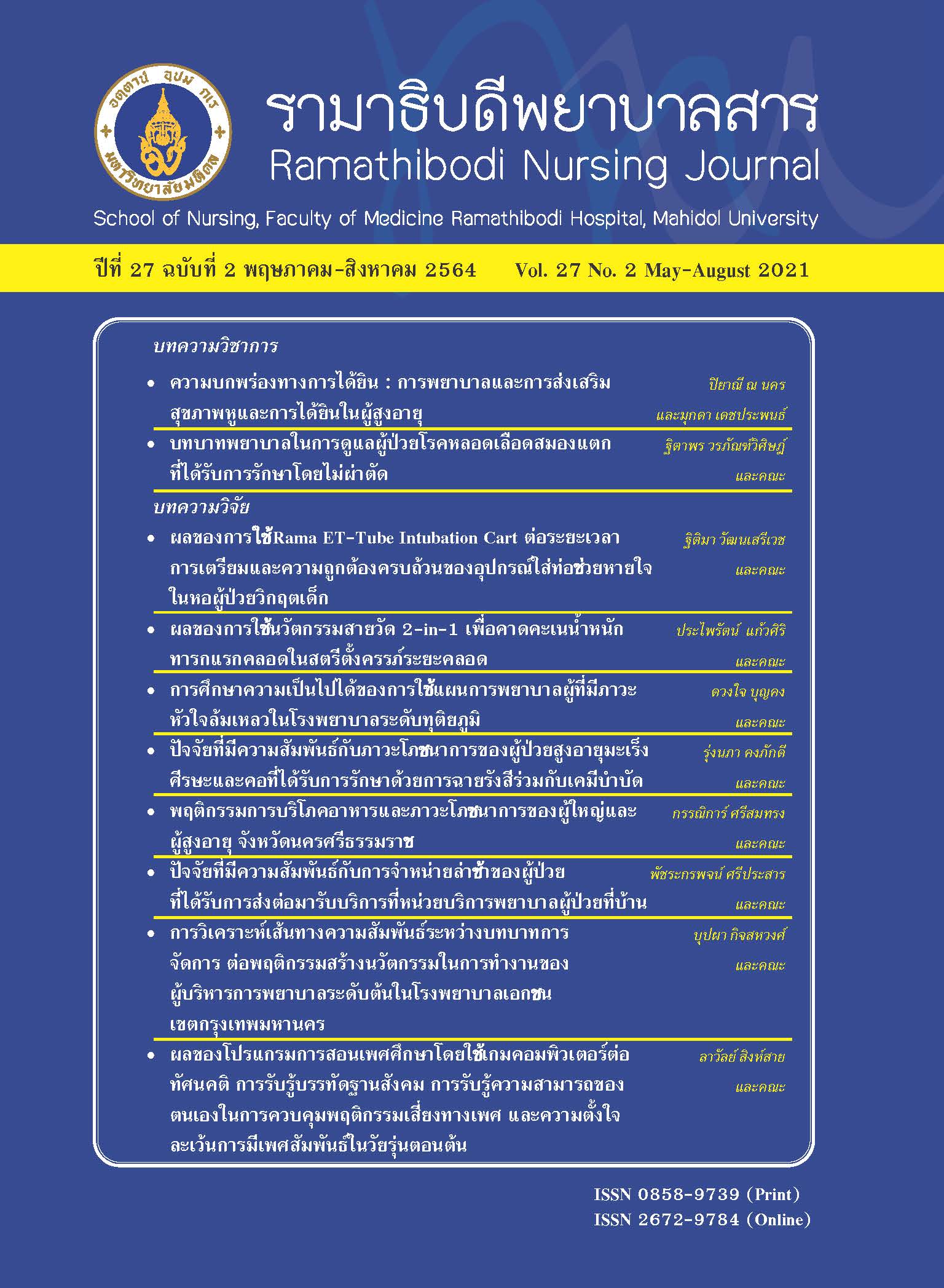Hearing Impairment : Nursing Care of Ear and Hearing Health Promotion in Older Persons
Main Article Content
Abstract
Hearing impairment that occurs in older persons tends to increase due to physical changes and the lack of promoting the ear health of older persons. This older population with hearing impairment and their families or caregivers experience longterm effects on physical, mental, emotional, social, and economic dimensions. This article aims to present knowledge about age-related changes of the ears, the importance of hearing impairment, and ear and hearing health promotion in older persons. Nurses can play significant roles in promoting hearing health and prevent untimely hearing impairment. This article provides information on hearing impairment regarding agerelated changes, types, causes, risk factors, impacts, and nursing practice to care for and promote the ear and hearing health of older persons with this problem. This information
is expected to be useful for nurses to promote ear and hearing health for enhancing the quality of life of older persons with hearing impairment.
Keywords: Hearing impairment, Nursing, Ear and hearing health promotion, Older persons
Article Details
บทความ ข้อมูล เนื้อหา รูปภาพ ฯลฯ ที่ได้รับการตีพิมพ์ในรามาธิบดีพยาบาลสาร ถือเป็นลิขสิทธิ์ของวารสาร หากบุคคลหรือหน่วยงานใดต้องการนำทั้งหมดหรือส่วนหนึ่งส่วนใดไปเผยแพร่หรือเพื่อกระทำการใด ใด จะต้องได้รับอนุญาตเป็นลายลักษณ์อักษรจากรามาธิบดีพยาบาลสารก่อนเท่านั้น
References
Department of Older Persons. Statistics of the Thai elderly;2020 [cited 2020 October 1] ; Available from: https://www.dop.go.th/th/know/1/275 (in Thai)
Piphatvanitcha N. Nursing care for older adults with hearing loss. Songklanagarind Journal of Nursing. 2015;32
(3):67-76. (in Thai)
Opatwattana C, Utoomprurkporn N. Age-related hearing loss (presbycusis). Chula Med J. 2018; 62(2):175–85.
(in Thai)
Helzner EP, Patel AS, Pratt S, Sutton-Tyrrell K, Cauley JA, Talbott E. et al. Hearing sensitivity in older adults:
associations with cardiovascular risk factors in the health,aging and body composition study. J Am Geriatr Soc.
;59:972-79.
Lin FR. Hearing loss and cognition among older adults in the United States. J Gerontol A Bio Sci Med Sci.
;66A: 1131-6.
National Statistical Office of Thailand. Report of the elderly survey in Thailand B.E. 2557. Bangkok: Text and Journal;2016. (in Thai)
Assanasen P. Care of ear hygiene. [cited 2020 Nov 10].Available form: www.si.mahidol.ac.th/th/healthdetail.
asp 1102 (in Thai)
Koc AK, Karacan FA. Idiopathic sudden hearing loss:relationship with stress perception, coping styles,
temperament and personality traits. Med J Bakirkoy.2020;16(1):90-4.
Costa LD, Santos SN, Costa MJ. Unilateral hearing loss and the use of hearing aid: speech recognition, benefit,
self-perception of functional performance and satisfaction.Speech, Language, Hearing Sciences and Education
Journal. 2019;21(1):1-12.
Marandi A, Inzitari M, Udina C, Gual N, Mota M,Tassistro E, et al. Visual and hearing impairment are
associated with delirium in hospitalized patients: results of a multisite prevalence study. JAMDA. 2020. [cited
November 13]. Available form: https://www.sciencedirect.com/science/article/abs/pii/S152586102030832X.
Sittitrai P. Chaiyasate S. Kaewsiri S. Chowsilpa S. ENT textbook for general practice. Chiangmai. Langiagc center& advertisement co.,LTD; 2017. (in Thai)
Manual of volunteer training courses for people with physical and motor disabilities, hearing impairment and
communication disorders. 2015. (in Thai)
Fook L, Morgan R. Hearing impairment in older people:a review. Postgrad Med J. 2000;76:537-41.
Gaur K, Kasliwal N, Gupta R. (2012). Association of smoking or tobacco use with ear diseases among men: a
retrospective study. Tobacco Induced Disease.2012;10(4): 1-9.
Potaporn M, Apipan P, Tungvachirakul V, Niyumudomwatana N, Praveswararat P, Suphareokthaweechai R, Tanamai N,et al. Hearing loss. Thailand medical services profile 2011-2014. [cited 2020 November 3]. Available form:http://training.dms.moph.go.th/rtdc/storage/app/uploads/public.pdf (in Thai)
Nash SD, Cruickshanks KJ, Klein R, Klein BE, Nieto FJ,Huang GH, et al. The prevalence of hearing impairment
and associated risk factors: the Beaver Dam Offspring Study. Arch Otolaryngol Head Neck Surg. 2011;137:432-9.
Bernabei R, Bonuccelli U, Maggi S, Marengoni A, Martini A, Memo M, et al. Hearing loss and cognitive decline in older adults: questions and answers. Aging Clin Exp Res.2014;26:567-73.
Sarant J, Harris D, Busby P, Maruff P, Schembri A, Lemke U, et al. The effect of hearing aid use on cognition in older adults: Can we delay decline or even improve cognitive function. J Clin Med.2020;9(1):254-63.
Seiler A, Fagundes CP, and Christian LM. The impact of everyday stressors on the immune system and health. In:Chouker A. editors. Stress challenges and immunity in space. Switzerland: Springer; 2020. p.71-92.
Kamil RJ, Betz J, Powers BB, Pratt S, Kritchevsky S,Kritchevsky S, et al. Association of hearing impairment
with incident frailty and falls in older adults. J Aging Health. 2016;28 (4):644-60.
Li-Korotky H. Age-Related Hearing Loss: Quality of care for quality of life. The Gerontologist. 2012:52(2):265-
Harkin H., Kelleher C. Caring for older adults with hearing loss. Nursing Older People. 2011; 23(9):22-8.
Johns Hopkins Medicine. Effectively communicating with older adults who have hearing loss during covid-19.
covid-19 tip sheet: Story ideas from Johns Hopkins. News release 14-Jul-2020. [cited 2020 November 1].
Available form: https://www.eurekalert.org/pub_releases/2020-07/jhm-cts071420.php.
Yamasoba T, Lin F R, Someya S, Kashio A, Sakamoto T,Kondo K. Current concepts in age-related hearing loss:
epidemiology and mechanistic pathways. Hear Res.2013;303:30-8.


